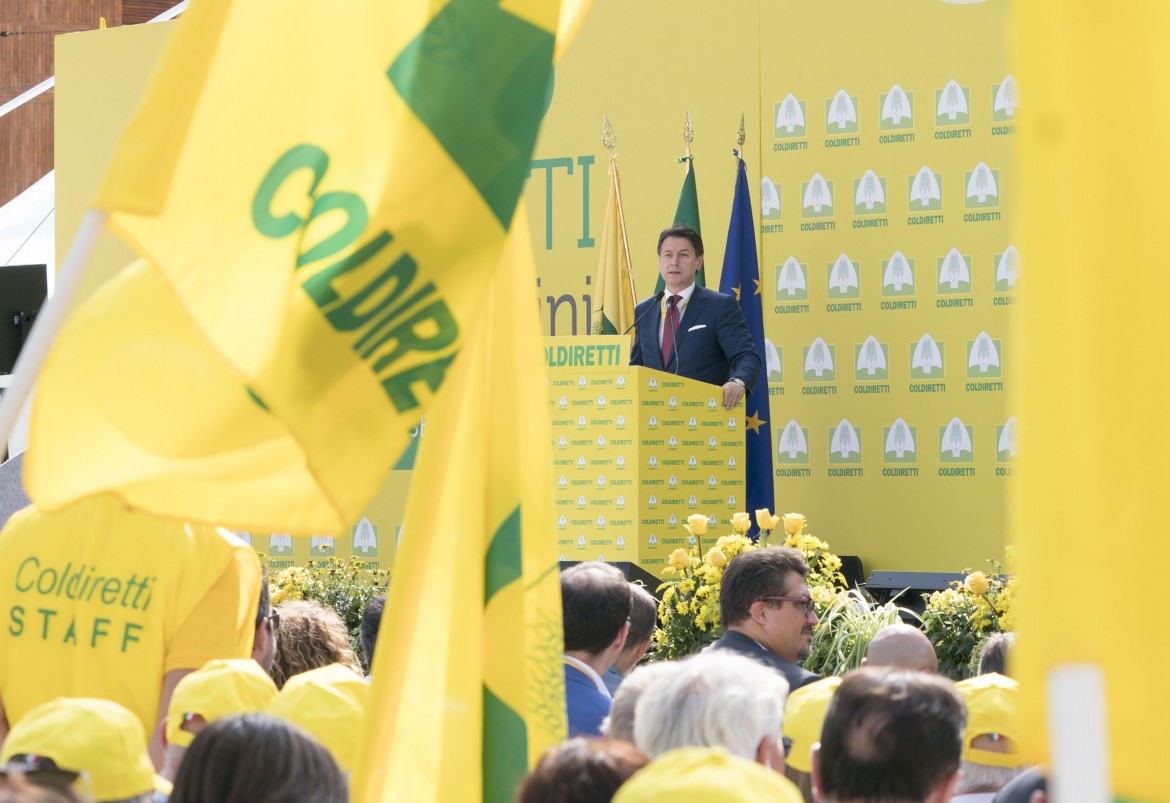Reportage
Conte signs ‘Parmesan Pact’ to reassure Italian agri-business ahead of Trump tariffs
The Italian Prime Minister signed his pledge on a wheel of cheese, swearing to defend Italy’s iconic agriculture industry against $7.5 billion in tariffs Trump has sought in exchange for illegal European subsidies for Airbus.

With billions in Trump tariffs bearing down on Europe, Italian Prime Minister Conte sought to reassure local agriculture producers in what has been dubbed the “Parmesan Pact.” By this document, signed symbolically on a wheel of cheese, the prime minister committed to finding a way to protect the Italian agri-food industry.
The agreement was signed at the large showcase village of the Coldiretti producers’ association in Bologna, featuring farmers, ranchers and producers who spoke up on Sunday in protest against the $7.5 billion worth of retaliatory tariffs announced by Trump earlier this year and reportedly approved by the World Trade Organization. Conte will try to lobby against the tariffs in early October, during the visit to Italy of US Secretary of State Mike Pompeo. “Together with Di Maio, he will ask to remove the agri-food sector from the US tariffs list,” says the president of the Parmigiano Reggiano Consortium, Nicola Bertinelli, who remains hopeful.
If the tariffs do kick in, the impact could be immediate. According to Bertinelli, with the new tariffs imposed by Trump, “the price of our product on American store shelves would jump from $40 to $60 per kilogram. That would mean losing up to 90% of the US market.” While at first glance it looks like this wouldn’t have a great impact on the consortium (representing companies with a total of 50,000 employees), as the figures show that their exports to the United States account for just 8% of the total, suddenly losing that percentage of their business overnight could have serious repercussions on the entire Italian dairy sector.
The situation is already problematic as it is. The market for imitation products—currently estimated to be worth €2 billion outside Europe, involving brands using the names “Parmesan,” “Parmezano” or “Parmesao”—continues to grow. If and when the Trump tariffs materialize, these knockoff products would spread even more.
This week, all eyes are on the WTO, which was set to formally declare whether Trump’s tariffs are justified. The US administration says blood money is due in exchange for the losses to the US aerospace company Boeing, which has allegedly suffered from European state aid to the Airbus consortium, its primary rival. Though the dispute centers on the aerospace sector, the tariffs will hit a wide range of goods, including agribusiness products.
As many have feared, this could be the start of yet another trade war, which looks set to hit not only Italian cheeses, but also olive oil, wine, pasta and fruit. In short, the top products of Italian agribusiness are under threat, with hundreds of thousands of jobs at risk.
As the producers sounded the alarm, Conte promised on Sunday that he would “make every effort.”
“It’s not easy,” said the prime minister, “because, despite the good relations, including on a personal level, between our two countries, we are in a negotiating framework in which the United States is defending its national interests, as we are doing as well.” Another complicating factor is the CETA treaty, the international free trade treaty between Canada and the European Union, which is still awaiting formal ratification by Italy, but which is already in force on matters pertaining to the EU as a whole.
Over years of struggle, a broad alliance has coalesced against this treaty, including ARCI, Legambiente, Greenpeace, Slow Food, Fairwarch, the Coldiretti producers’ association and a number of consumer associations.
Theoretically, the treaty should make it easier to trade goods, but in practice, it could lead to the downgrading of protections for workers and consumers by revising regulations and quality standards downwards.
The problem is all the more serious because our Agriculture Minister, Teresa Bellanova, a veteran of the Renzi government, has repeatedly defended this treaty. “I wasn’t the one who negotiated the CETA treaty, and its terms are not being discussed in Parliament now: the CETA is already here, it is in force,” she said in Bologna on Friday before an audience of producers. Ten days ago, Bellanova made a public call to “work for the ratification” of the treaty, meaning the final ratification which is up to the individual countries, and which is being met with plenty of skepticism on the part of the Five Stars.
Things did go better on the GMO front, where Bellanova signaled a change in her previous position: “GMOs are banned in Italy, and will remain so.” Although Conte took pains to correct Bellanova on the CETA issue less than 24 hours later (“Bellanova has understood that there are critical issues, and we will take them into account in the assessment that we will perform together,” said the prime minister), the producers remain concerned.
The exports of Parmigiano and Grana cheese to Canada dropped by 10% in the first three months of 2018, subsequent to the entry into force of a provisional form of the CETA. This, according to Coldiretti, gave a boost to the market for knockoff parmesan. “The issue of the CETA is a complex one,” Bertinelli explains. ”I want to point out that in Canada, there are regulations which authorize the feeding of cattle with meat-and-bone meal, and the extensive use of glyphosate. This is not the quality we want.”
Originally published at https://ilmanifesto.it/conte-patto-del-formaggio-contro-i-dazi-dellamico-trump/ on 2019-09-29
